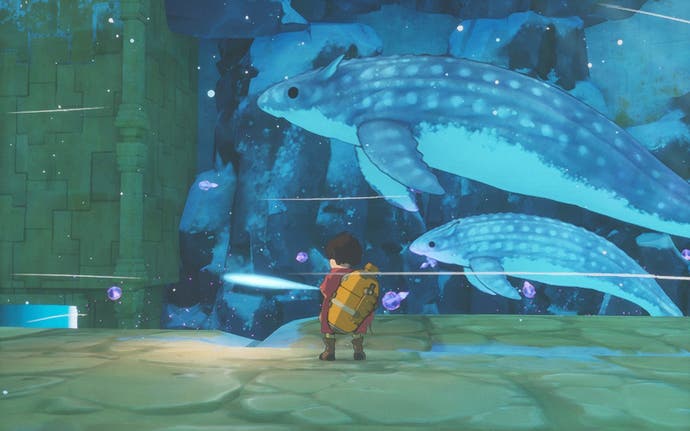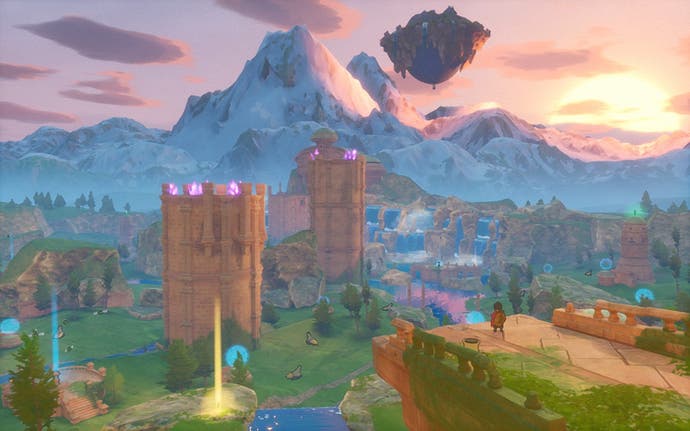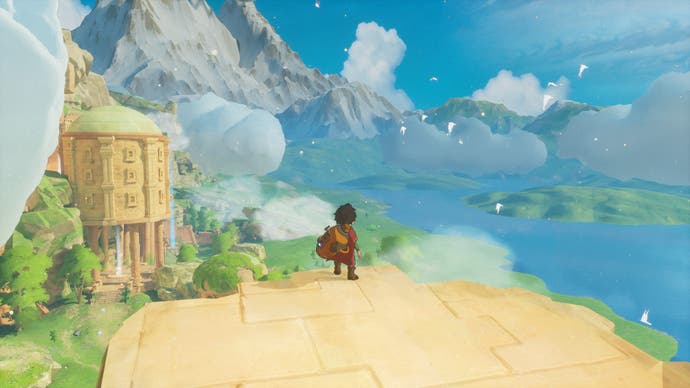Europa review - ecological ruminations on a distant moon
Crater see you.
Did you know that Studio Ghibli got its name from an Italian plane? As the story goes, founder Hayao Miyazaki took inspiration from a World War II era aircraft called the Caproni Ca.309, which was used for reconnaissance in the North African desert. The plane was commonly known by its nickname Ghibli, which roughly translates to 'southern wind' in Libyan Arabic. A Ghibli wind is known as a fierce, hot and dry air current that carries dust from the North African interior towards the Mediterranean sea. For this reason, some have speculated that Miyazaki chose the name to indicate Studio Ghibli's intention to shake up the animation industry.
There's a sense of wind in Europa, too - a game that seems to have been heavily inspired by the works of Miyazaki. But Europa's wind is more of a gentle guide than a disruptive force. It nudges you along the main path, pushing you up hilltops and towards doorways to lead you through the world. It encourages you to linger and bobble above vibrant landscapes - giving you a chance to absorb their beauty, and understand their inherent worth. This is a game all about flow, and the importance of being in-tune with the world around you. And, more ominously, it's a warning of the potentially dire consequences for the human race should we continue to separate ourselves from nature.
Set on one of Jupiter's moons in the distant future, Europa sees you play as Zee - a mysterious android child who seems to be totally alone in an alien landscape. Scattered throughout this world are pages of a journal, written by a man called Adam, who identifies himself as Zee's father. Addressing his son through the journal, Adam reveals that he is no longer alive, and Zee should visit him on 'The Island' should he ever start to feel lonely. Floating above the landscape and viewable at all times, this is a vast levitating city that apparently holds the last of humanity on Europa. To find out answers about what happened on this strange moon, this is where you must head.
Thus begins a winding journey through Europa's world, where stopping to admire the view is kind of the point. There's no urgency to this expedition, and the game is frequently quite keen to steer you towards gorgeous panoramas. Emerging at the top of a tower will cause the camera to broaden outwards - asking you to stop for a moment to admire the beauty of the Ghibli-esque world around you. This is a classic video game trick, and one I'll never grow tired of. Handily, these 'vista' moments also give you a chance to survey the area in front of you, allowing you to identify routes through the world towards golden glowing journal pages that reveal more of the story. With a jetpack on your back, you fly and glide between glowing blue spheres to collect fuel, like a form of human-robot bumblebee. Although some faster segments of Europa remind me of Jenova Chen's Flower, for the most part, the flight movement is closer to Spyro the Dragon: short bursts of energy that must be carefully managed in order to reach high towers and platforms. It's bobbly and often ungainly, but there's something about wobbling your way through the world that feels quite endearing. There's definitely a knack to learning these flight mechanics, and you become more efficient at using them with practice. It also doesn't hurt to find some of the hidden jetpack capacity upgrades that can boost your airtime.

Although Europa conjures the illusion of an open world, it's actually structured as a series of broad levels, each of which has a very clear direction of travel. Progressing between these regions often requires you to solve puzzles, none of which are particularly difficult: you might have to parkour between disappearing blocks, or activate glowing cubes hidden around the landscape. The intention here is not to present a gauntlet of challenging brain teasers, but to encourage you to poke around the world, and develop an attachment to its natural elements. During these tasks, you encounter many of Europa's creatures: strange fusions of technology and biology that all form part of a unique ecosystem. As you learn through your journey, humans sent a terraforming AI to Europa to 'prepare' it for human life, which resulted in the creation of many weird and wonderful creatures. (Finally, a generative AI that did something useful.) Embedded within the programming, however, was an instruction to prevent anything that could make the planet unlivable. When humans started to mine on Europa, this inevitably caused problems.
This element of friction, although a key part of the storytelling, is one of the few areas where Europa does fall down somewhat. Many levels require you to dodge creatures' projectiles, and it's easy to become stunlocked by these when you're low on jetpack fuel: something that severely disrupts the flow of the game, and makes you feel like you're flopping around like a fish. It's also a little irritating when you're trying to view a journal page and find yourself being bombed by rhinos. Nonetheless, when they're not dropping explosives on your head, Europa's creatures are really quite charming. One particularly memorable sequence sees you enter an area that feels almost underwater in design, and fly alongside a whale-like mother and calf. It's serene and peaceful, accompanied by soothing music, and makes you feel intimately connected to Europa's natural world.

Europa is a game that doesn't outstay its welcome: you can float through its world in a single three-hour sitting, if you so wish. Yet even during this limited amount of time, it's able to make you care rather deeply about its vibrant natural world. Europa delivers several salient points about humanity's relationship with nature: as conveyed by that floating island, we have a tendency to view nature as separate from humanity, rather than something we are intrinsically connected to. We cannot keep looking to new planets, new areas to exploit, until we have first repaired our flawed relationship with nature - or the same old mistakes will simply reoccur. It's something to bear in mind for the real world, as NASA prepares to send the Clipper probe to Europa to discover whether this moon could be habitable. It's a launch that, rather ironically, was delayed due to the ferocity of Hurricane Milton: a storm made more violent by the effects of human-caused climate change. Thinking back to the video game Europa, if there's one thing its story suggests, it's that second chances for humanity are not guaranteed. Perhaps before looking to other worlds for salvation, we should first take better care of our own.
A copy of Europa was provided for review by Future Friends Games.


